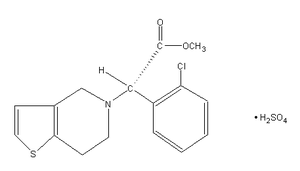Clopidogrel
|
|
| methyl (+)-(S)-α-(2-chlorophenyl)-6, 7-dihydrothieno[3,2-c]pyridine-5(4H)-acetate sulfate (1:1) | |
| Molecular Weight | 419.9 |
| Empiric Formula | C16H16Cl NO2S·H2SO4 |
| Metabolism | Liver |
| Excretion | Renal |
Clopidogrel, which is often prescribed under the brand name Plavix ® (clopidogrel bisulfate; produced by Bristol-Myers Squibb and Sanofi-Synthelabo (http://www.sanofi-synthelabous.com/)), is a potent oral antiplatelet agent often used in the treatment of coronary artery disease, peripheral vascular disease, and cerebrovascular disease.
| Contents |
Pharmacology
The mechanism of action of clopidogrel is irreversible inhibition of the adenosine diphosphate (ADP) receptor of platelet cell membranes. This prevents aggregation of platelets.
Two hours after a single dose of oral Plavix®, platelet inhibition can be demonstrated.
Pregnancy category
Clopidogrel is pregnancy category B. This means that in animal models, there is no risk of adverse effects in doses equivalent to doses that a pregnant female would ingest. The implication is that the medication is probably safe to administer during human pregnancy. It is currently unknown whether clopidogrel is excreted in human breast milk.
Adverse effects
Serious adverse effects that are associated with clopidogrel include:
- Severe neutropenia (Incidence: 5/10,000)
- Thrombotic thrombocytopenic purpura (TTP) (Incidence: 4/1,000,000 patients treated)
- Hemorrhage - The incidence of hemorrhage may be increased by the co-administration of aspirin.
- Gastrointestinal Hemorrhage (Incidence: 2.0%)
- Cerebral Hemorrhage (Incidence: 0.1 to 0.4%)
Most consensus-based therapeutic guidelines recommend the use of clopidogrel, over aspirin, in patients requiring antiplatelet therapy but with a history of gastric ulceration due to the lower incidence of gastric ulceration associated with the use of clopidogrel vs aspirin. A recent study has shown that in patients with healed aspirin-induced ulcers, however, patients receiving aspirin plus the proton pump inhibitor esomeprazole had a lower incidence of recurrent ulcer bleeding than patients receiving clopidogrel. (Chan et al., 2005)
References
- Chan FKL, Ching JYL, Hung LCT, Wong VWS, Leung VKS, Kung NNS, et al (2005). Clopidogrel versus aspirin and esomeprazole to prevent recurrent ulcer bleeding. New Engl J Med 352 (3), 238-244.
External Links
- Plavix : Information for the General Public (http://www.plavix.com/DTC/home.html)
- Plavix : Primary Care Physician (http://www.plavix.com/HCP/primary_index.jsp)
- Plavix : Cardiology (http://www.plavix.com/HCP/cardiology_index.jsp)
- Plavix : Neurology (http://www.plavix.com/HCP/neurology_index.jsp)pt:Clopidogrel

